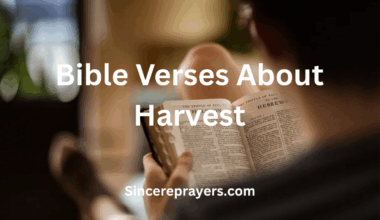Contentment is a profound biblical principle that often gets overlooked in a world driven by comparison, ambition, and constant striving. The Apostle Paul reminds us in Philippians 4:11–12 that contentment is not circumstantial, it is a choice rooted in faith. True satisfaction comes not from wealth, achievements, or recognition but from a steadfast trust in God’s provision and timing. When we anchor our hearts in Him, we experience peace that transcends circumstances.
Life is full of trials, uncertainties, and unexpected turns, yet contentment teaches us to remain steady. It is not about complacency or neglecting responsibility; rather, it is the grace to accept life as it unfolds while holding onto God’s promises. By cultivating contentment, we resist the trap of endless striving and find joy in what God has already provided. Scripture offers abundant wisdom to guide us toward this peaceful, grounded state of mind.

In this article, we explore 35 powerful Bible verses about contentment that reveal God’s guidance, encouragement, and promises. Each verse serves as a reminder that our joy and satisfaction are ultimately found in Him. Whether you face financial struggles, relational challenges, or spiritual doubts, these verses inspire you to trust God’s provision, rejoice in simplicity, and embrace the fullness of life He offers through His grace.
35 Powerful Bible Verses About Contentment in 2025
1. Philippians 4:11
“I have learned to be content whatever the circumstances.”
Paul’s reflection on contentment highlights a spiritual maturity that comes from reliance on God rather than external conditions. He emphasizes that contentment is not a feeling but a deliberate choice rooted in faith. Life will bring highs and lows, but when we learn to trust God, we find stability and peace. This verse challenges believers to cultivate contentment through prayer, dependence on God, and an attitude of gratitude, regardless of external circumstances.
2. 1 Timothy 6:6
“But godliness with contentment is great gain.”
Here, Paul connects spiritual devotion with inner satisfaction, showing that true gain is found in godliness paired with contentment. Material wealth or worldly success cannot replace the fulfillment that comes from living according to God’s will. Contentment rooted in faith guards against greed, anxiety, and discontentment. By focusing on spiritual growth and trusting God’s provision, believers experience genuine peace, demonstrating that godliness and satisfaction together lead to a life rich in eternal value.
3. Hebrews 13:5
“Keep your lives free from the love of money and be content with what you have, because God has said, ‘Never will I leave you; never will I forsake you.’”
This verse reminds us that contentment stems from confidence in God’s presence and provision. Our hearts should not cling to material possessions as sources of security. God’s promise of unwavering presence assures us that our needs are met in Him. When we learn to rest in God’s faithfulness, we are freed from anxiety and comparison, embracing a life of gratitude. Contentment flows naturally from trusting that God is always near and sufficient.
4. Psalm 23:1
“The Lord is my shepherd, I lack nothing.”
David’s declaration exemplifies ultimate contentment—a heart fully satisfied in God’s guidance and care. By acknowledging the Lord as our shepherd, we trust Him to provide our every need, spiritually and materially. Contentment does not demand abundance; it flourishes in reliance on God’s provision. This verse teaches believers that security, peace, and satisfaction are found not in possessions but in the loving and attentive care of the Lord, who ensures that our needs are always met.
5. Proverbs 19:23
“The fear of the Lord leads to life; then one rests content, untouched by trouble.”
This verse highlights that true contentment begins with reverence for God. When we honor Him, our priorities shift from worldly pursuits to eternal values. Fear of the Lord instills wisdom, peace, and security that cannot be shaken by trials. By depending on God’s guidance, we find rest in our hearts. Contentment emerges as we trust that He is in control and that our lives are fully held in His care.
6. Ecclesiastes 5:10
“Whoever loves money never has enough; whoever loves wealth is never satisfied with their income. This too is meaningless.”
Solomon warns against the pursuit of wealth as a path to satisfaction. True contentment cannot be purchased, accumulated, or earned. Desire for material gain often leads to frustration and emptiness. Instead, Scripture calls us to seek spiritual riches and trust in God’s provision. When our focus is on Him, not possessions, we find peace and fulfillment. Contentment grows as we learn to appreciate what God already provides.
7. 1 Thessalonians 4:11-12
“Make it your ambition to lead a quiet life: You should mind your own business and work with your hands, just as we told you.”
Paul encourages believers to pursue a simple, diligent, and peaceful lifestyle. Contentment often comes through living quietly and avoiding comparison or envy. By focusing on our responsibilities and trusting God for provision, we cultivate satisfaction in daily life. This verse teaches that a humble, steady approach fosters joy, reduces anxiety, and reflects God’s wisdom. Contentment is found in faithful work, self-discipline, and gratitude for ordinary blessings.
8. Matthew 6:25
“Therefore I tell you, do not worry about your life, what you will eat or drink; or about your body, what you will wear.”
Jesus reminds us that anxiety over provision is unnecessary when we trust in God. Worry often stems from discontentment and a lack of trust. This verse invites believers to focus on God’s kingdom rather than earthly needs. Contentment grows as we learn to rely on His faithful provision. By prioritizing spiritual pursuits and trusting in God’s care, we experience freedom from stress and a heart at peace with His plan.
9. Luke 12:15
“Watch out! Be on your guard against all kinds of greed; life does not consist in an abundance of possessions.”
Jesus cautions that life’s true value is not measured by wealth or possessions. Contentment is cultivated when we avoid greed and material obsession. Spiritual fulfillment comes from aligning our hearts with God’s will, not accumulating worldly things. By shifting our focus to gratitude, service, and trust in God, we discover joy in simplicity. This verse teaches that contentment is a choice rooted in wisdom and dependence on divine provision.
10. James 1:17
“Every good and perfect gift is from above, coming down from the Father of the heavenly lights.”
James emphasizes that all blessings originate from God, encouraging gratitude and satisfaction. Recognizing God as the source of every good gift cultivates contentment and reduces envy or longing. By acknowledging His generosity, we learn to rejoice in what we have rather than what we lack. Contentment arises as we trust God’s timing and wisdom, appreciating the abundance already present in our lives, both seen and unseen.
11. Psalm 34:10
“The lions may grow weak and hungry, but those who seek the Lord lack no good thing.”
This verse reminds us that God provides for those who earnestly seek Him. Physical or material scarcity does not equate to spiritual lack. When our hearts are aligned with God’s will, contentment flows naturally because we trust His care. By depending on Him rather than circumstances, we gain peace and assurance. Contentment is cultivated as we recognize that God’s provision surpasses human understanding, meeting our deepest needs in every season of life.
12. Proverbs 30:8-9
“Give me neither poverty nor riches, but give me only my daily bread. Otherwise, I may have too much and disown you, saying, ‘Who is the Lord?’”
Agur’s prayer reflects a desire for balance, humility, and dependence on God. Excess wealth can lead to pride, while poverty can lead to despair. Contentment lies in trusting God for what is sufficient each day. This verse teaches believers to focus on daily provision, cultivate gratitude, and avoid extremes that challenge faith. True satisfaction is found in reliance on God, not in abundance or lack, fostering a heart at peace with His plan.
13. Philippians 4:12-13
“I know what it is to be in need, and I know what it is to have plenty. I can do all this through him who gives me strength.”
Paul demonstrates that contentment transcends circumstances because it is rooted in Christ’s strength. He rejoices in God’s sufficiency whether in abundance or need. This teaches that external conditions do not determine our peace. When we rely on God’s power, we gain the resilience to face challenges and celebrate blessings alike. Contentment is nurtured through trust in Christ, who equips believers to endure hardships and find joy in every season.
14. 2 Corinthians 12:9-10
“My grace is sufficient for you, for my power is made perfect in weakness… Therefore I will boast all the more gladly about my weaknesses.”
Paul’s response to his hardships illustrates contentment rooted in God’s grace. When we accept our weaknesses, we allow God’s strength to sustain us. Contentment arises not from self-sufficiency but from reliance on divine power. This verse teaches that trials can become sources of spiritual growth and joy. By embracing limitations with faith, we experience fulfillment and peace that surpass worldly understanding, finding sufficiency in God’s unchanging grace.
15. Matthew 6:33
“But seek first his kingdom and his righteousness, and all these things will be given to you as well.”
Jesus emphasizes prioritizing God’s kingdom above worldly concerns. Contentment grows when our hearts are aligned with His purpose, trusting that all needs are met through divine provision. By seeking righteousness, we shift focus from anxiety and comparison to faith and gratitude. This verse teaches that spiritual priorities create inner peace. True satisfaction flows naturally from devotion, as God ensures our needs are provided according to His perfect wisdom.
16. Romans 8:28
“And we know that in all things God works for the good of those who love him, who have been called according to his purpose.”
This verse reminds us that contentment comes from trusting God’s plan, even amid difficulties. All experiences, positive or challenging, contribute to His divine purpose. By embracing this truth, believers can rest in peace, knowing nothing is wasted. Contentment is nurtured when we view life through the lens of faith, understanding that God orchestrates everything for ultimate good. Gratitude and trust replace anxiety, fostering a heart satisfied in Him.
17. Psalm 37:7
“Be still before the Lord and wait patiently for him; do not fret when people succeed in their ways.”
David teaches that contentment involves patience and trust, avoiding jealousy or comparison. When we focus on God rather than others’ successes, our hearts find peace. Stillness before the Lord cultivates confidence in His timing and provision. By surrendering anxiety and cultivating faith, believers experience satisfaction even in seasons of waiting. This verse emphasizes that contentment is a choice to trust God and rejoice in His faithfulness, regardless of external circumstances.
18. 1 Peter 5:7
“Cast all your anxiety on him because he cares for you.”
Peter encourages believers to release burdens and trust God’s care. Anxiety often stems from discontentment or self-reliance. Contentment grows when we surrender our worries and acknowledge God’s loving provision. By casting all concerns on Him, we receive peace that the world cannot provide. This verse teaches that trust in God fosters emotional and spiritual satisfaction, allowing hearts to rest fully in His presence and care.
19. Colossians 3:15
“Let the peace of Christ rule in your hearts, since as members of one body you were called to peace. And be thankful.”
Contentment is closely linked to gratitude and the peace of Christ. When we allow His peace to govern our hearts, envy, anxiety, and discontent diminish. This verse teaches that satisfaction comes from inner harmony, faith, and thankfulness. By focusing on God’s goodness and maintaining a heart of gratitude, believers cultivate joy and serenity, finding contentment in their circumstances and relationships.
20. Isaiah 26:3
“You will keep in perfect peace those whose minds are steadfast, because they trust in you.”
Isaiah highlights the connection between trust and contentment. Steadfast faith brings perfect peace, independent of life’s chaos. Contentment arises when we focus on God rather than fleeting circumstances. By trusting Him, our minds and hearts remain anchored, free from fear or envy. This verse encourages believers to maintain unwavering reliance on God’s faithfulness, resulting in satisfaction and serenity even amid trials.
21. Proverbs 15:16
“Better a little with the fear of the Lord than great wealth with turmoil.”
This verse emphasizes that true contentment comes from reverence for God rather than material abundance. Wealth can bring anxiety, distraction, and unrest, while a humble life anchored in faith fosters peace and satisfaction. Contentment is found in trusting God’s provision, even in simplicity. By valuing spiritual well-being over material accumulation, believers experience inner calm, gratitude, and fulfillment that cannot be shaken by circumstances or worldly desires.
22. Luke 3:14
“Don’t extort money and don’t accuse people falsely—be content with your pay.”
John the Baptist teaches that integrity and fairness are paired with contentment. Satisfaction arises not from greed but from living righteously and trusting God for provision. When we embrace honesty and avoid envy, we cultivate peace of heart. This verse reminds believers that ethical living and trust in God’s care lead to contentment, demonstrating that joy is rooted in faithfulness rather than external rewards or worldly gain.
23. Psalm 16:5-6
“Lord, you alone are my portion and my cup; you make my lot secure. The boundary lines have fallen for me in pleasant places; surely I have a delightful inheritance.”
David acknowledges God as his ultimate source of satisfaction. Contentment flows from recognizing that spiritual inheritance and divine care outweigh material gain. Trusting God’s guidance, even in life’s uncertainties, brings peace and assurance. When believers view God as their portion, desires for excess or comparison fade. This verse teaches that true fulfillment is found in God’s provision and promises, fostering gratitude, joy, and a heart satisfied with His abundant blessings.
24. 2 Thessalonians 3:10
“For even when we were with you, we gave you this rule: ‘The one who is unwilling to work shall not eat.’”
Paul links contentment to diligence and responsibility. Satisfaction grows when we contribute faithfully to our needs without envy or idleness. Contentment involves appreciating the fruits of honest labor and trusting God for provision. This verse reminds believers that peace and fulfillment are cultivated through diligence, integrity, and gratitude, rather than resentment or reliance on others. Work and trust in God together nurture a balanced, contented life.
25. Job 1:21
“The Lord gave and the Lord has taken away; may the name of the Lord be praised.”
Job exemplifies contentment amid loss, showing that faith does not depend on circumstances. True contentment arises from trust in God’s sovereignty and unchanging goodness. By acknowledging God’s authority over all things, believers cultivate peace, gratitude, and resilience. This verse teaches that a heart focused on praise, even in adversity, experiences stability and satisfaction, demonstrating that contentment is rooted in unwavering trust rather than external conditions.
26. Ecclesiastes 4:6
“Better one handful with tranquility than two handfuls with toil and chasing after the wind.”
Solomon contrasts restless striving with peaceful simplicity. Contentment is found in sufficiency and trust rather than constant accumulation. Chasing more often leads to stress, comparison, and dissatisfaction. By embracing God’s provision and focusing on gratitude for what we have, believers cultivate a peaceful, contented heart. This verse emphasizes that tranquility and trust are more valuable than abundance gained through anxiety or unrelenting ambition.
27. Psalm 62:10
“Do not trust in extortion or put vain hope in stolen goods; though your riches increase, do not set your heart on them.”
David warns against placing trust in material gain. Contentment emerges when hearts are anchored in God rather than wealth or schemes. Reliance on God’s provision and guidance ensures satisfaction and stability. By valuing integrity, gratitude, and faith over worldly success, believers maintain peace and joy. This verse reminds us that contentment comes from spiritual trust, not accumulation, guarding hearts from greed and envy while fostering a lasting sense of fulfillment.
28. Matthew 11:28-30
“Come to me, all you who are weary and burdened, and I will give you rest. Take my yoke upon you and learn from me, for I am gentle and humble in heart, and you will find rest for your souls.”
Jesus offers contentment through rest in Him, even amidst life’s pressures. True satisfaction comes from surrendering burdens and learning from His humility and gentleness. By trusting Christ, believers experience relief from anxiety and a heart at peace. This verse teaches that contentment is cultivated through spiritual dependence, letting go of control, and embracing the rest God provides for weary souls, leading to joy, balance, and inner tranquility.
29. Romans 12:12
“Be joyful in hope, patient in affliction, faithful in prayer.”
Paul links contentment to patience, joy, and steadfast faith. Satisfaction is rooted not in circumstances but in trust and hope in God. By embracing prayer, patience, and joyful expectation, believers cultivate resilience and peace. This verse teaches that contentment grows through spiritual discipline, perspective, and reliance on God. Joy and peace emerge naturally when hearts remain focused on God’s promises rather than temporal challenges or unmet desires.
30. Jeremiah 29:11
“For I know the plans I have for you,” declares the Lord, “plans to prosper you and not to harm you, plans to give you hope and a future.”
Jeremiah reassures believers that God’s plans are perfect and purposeful. Contentment arises from trust in His sovereignty, knowing He orchestrates life for good. Anxiety and discontent fade when we rely on God’s guidance and provision. This verse encourages believers to surrender control, embrace His timing, and find peace in His promises. True satisfaction comes from faith that God’s plans are sufficient, protecting hearts from worry and fostering enduring contentment.
31. Psalm 73:25-26
“Whom have I in heaven but you? And earth has nothing I desire besides you. My flesh and my heart may fail, but God is the strength of my heart and my portion forever.”
Contentment stems from valuing God above all else. When earthly desires are secondary to a relationship with Him, satisfaction deepens. Trusting God as our strength sustains us through trials and weakness. This verse teaches believers that spiritual connection brings lasting peace and fulfillment, fostering contentment even when physical strength or worldly opportunities decline. God becomes our portion, replacing longing with enduring joy and assurance.
32. Isaiah 58:11
“The Lord will guide you always; he will satisfy your needs in a sun-scorched land and will strengthen your frame. You will be like a well-watered garden, like a spring whose waters never fail.”
Isaiah assures that God’s guidance brings sufficiency and renewal. Contentment is nurtured by trust in His provision, even in challenging circumstances. When we rely on God to meet spiritual and physical needs, anxiety diminishes and peace flourishes. This verse teaches that satisfaction flows from dependence on God’s sustaining power, resulting in a flourishing, well-nourished life marked by gratitude, joy, and spiritual stability.
33. Deuteronomy 8:18
“But remember the Lord your God, for it is he who gives you the ability to produce wealth, and so confirms his covenant, which he swore to your ancestors, as it is today.”
Contentment arises from acknowledging God as the source of all ability and provision. Wealth or success should be viewed as gifts, not ultimate goals. By remembering His faithfulness, believers cultivate gratitude and avoid pride or dissatisfaction. This verse emphasizes reliance on God for every blessing, fostering a heart that values His provision and maintains peace, satisfaction, and trust regardless of external achievements or material accumulation.
34. Psalm 119:57
“You are my portion, Lord; I have promised to obey your words.”
David finds contentment in God alone, recognizing Him as his ultimate inheritance. Satisfaction is rooted in obedience and devotion rather than worldly gain. By committing to follow God’s guidance, believers experience peace and fulfillment. This verse teaches that a heart centered on God cultivates joy, gratitude, and serenity, showing that spiritual connection is the true source of contentment and lasting satisfaction in life.
35. John 6:35
“Then Jesus declared, ‘I am the bread of life. Whoever comes to me will never go hungry, and whoever believes in me will never be thirsty.’”
Jesus offers ultimate contentment through spiritual nourishment. True satisfaction comes from Him rather than worldly resources. By trusting and following Christ, believers experience fulfillment that transcends physical needs. This verse teaches that contentment is found in a relationship with Jesus, who satisfies our deepest desires, sustains our souls, and provides peace and joy that no earthly circumstance can replace.
Conclusion
Contentment is both a mindset and a spiritual discipline, cultivated through faith and trust in God. The Bible consistently emphasizes that a heart anchored in Him finds peace regardless of circumstances. By meditating on the verses above and embracing God’s guidance, believers can resist discontentment, comparison, and the endless pursuit of worldly desires. True satisfaction comes from recognizing that God’s provision, timing, and care are perfect.
Practicing contentment requires daily surrender, gratitude, and humility. It is the recognition that our lives are gifts from God and that He is our ultimate source of fulfillment. While the world promotes accumulation and achievement as paths to happiness, Scripture teaches that joy comes from reliance on God’s promises. Embracing contentment allows us to live with fewer anxieties, richer relationships, and a deeper sense of peace.
Ultimately, contentment reflects a heart aligned with God’s will. It testifies to the sufficiency of His provision and the power of faith in every season of life. As believers, we are called to cultivate contentment through prayer, scripture meditation, and conscious gratitude. By grounding ourselves in God’s promises, we experience a fullness of life that cannot be shaken by external circumstances. Let these 35 Bible verses guide your journey toward a heart of contentment, transforming your perspective and drawing you closer to the God who fulfills every need.





